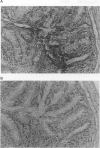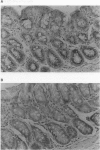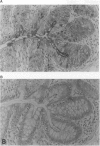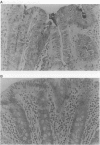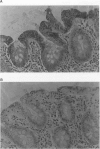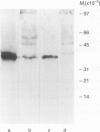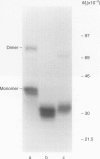Abstract
The CO17-1A/GA733 antigen is associated with human carcinomas and some normal epithelial tissues. This antigen has shown promise as a target in approaches to passive and active immunotherapy of colorectal cancer. The relevance of animal models for studies of immunotherapy targeting this antigen in patients is dependent on the expression of the antigen on normal animal tissues. Immunohistoperoxidase staining with polyclonal rabbit antibodies to the human antigen revealed the human homologue on normal small intestine, colon and liver of mice, rats and non-human primates, whereas mouse monoclonal antibodies to the CO17-1A or GA733 epitopes on the human antigen did not detect the antigen. Polyclonal rabbit antibodies, elicited by the murine antigen homologue derived from recombinant baculovirus-infected insect cells, immunoprecipitated the antigen from mouse small intestine, colon, stomach, kidney and lung. The isolated recombinant murine protein bound polyclonal, but not monoclonal, antibodies to the human CO17-1A/GA733 antigen, and recombinant human antigen bound polyclonal antibodies elicited by the murine antigen homologue. Thus, the antigen homologue expressed by animal tissues is similar, but not identical, to the human antigen. These results have important implications for experimental active and passive immunotherapy targeting the CO17-1A/GA733 antigen.
Full text
PDF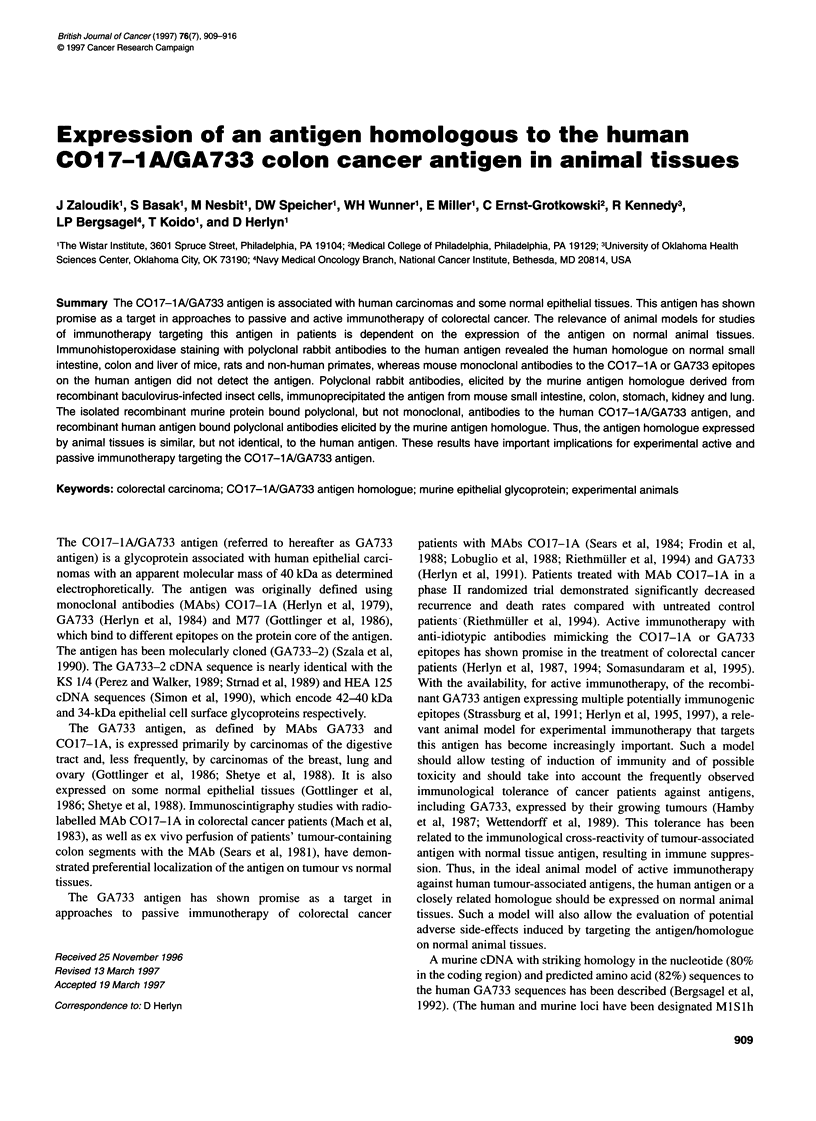
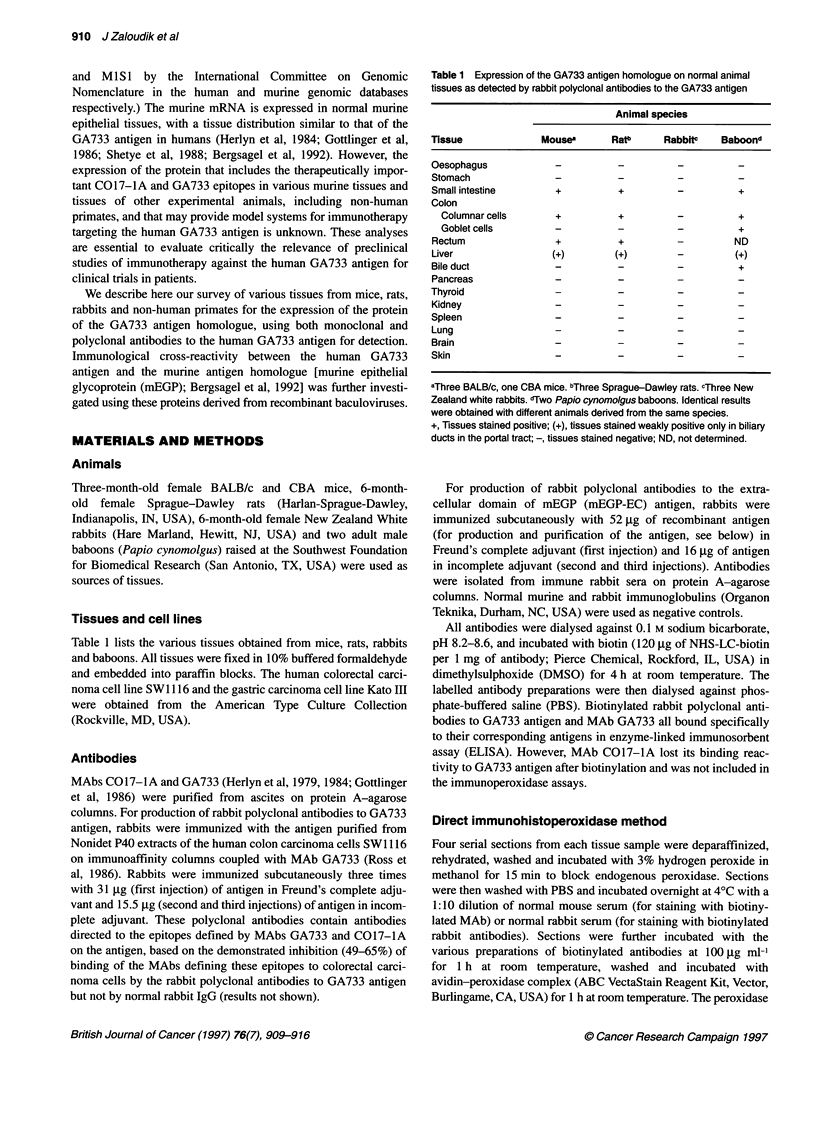
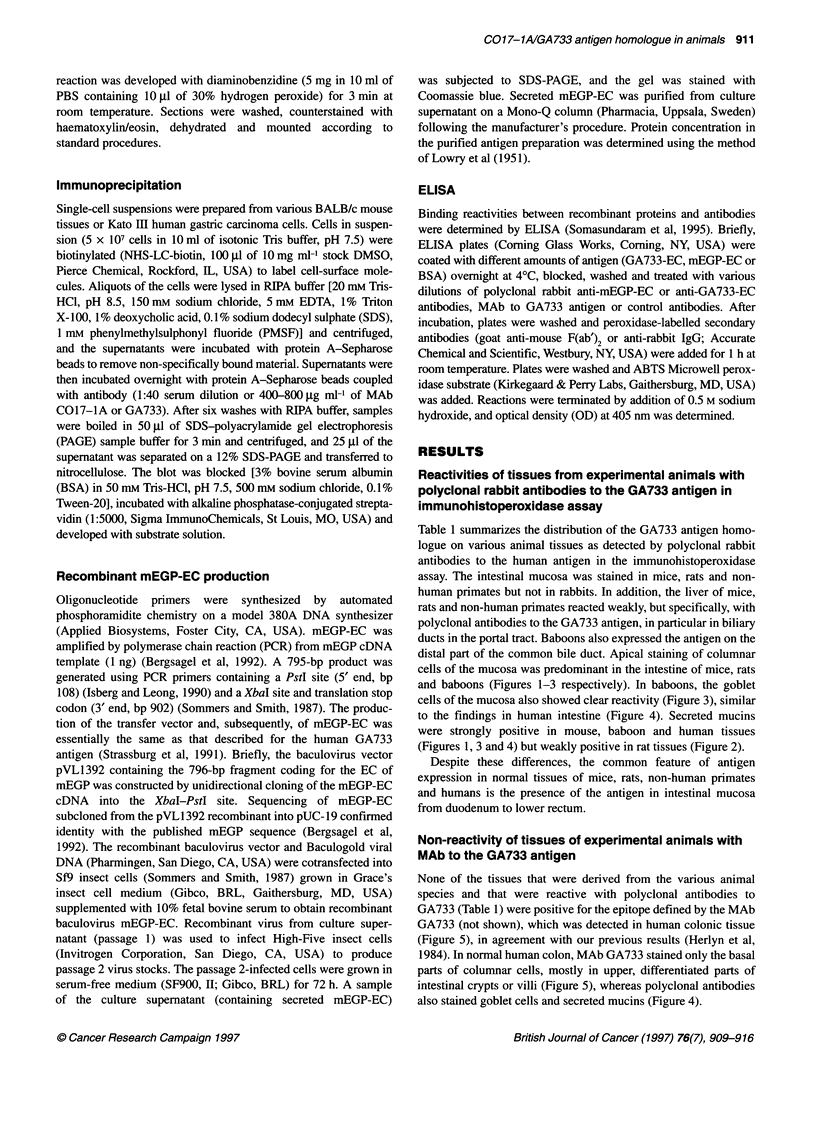
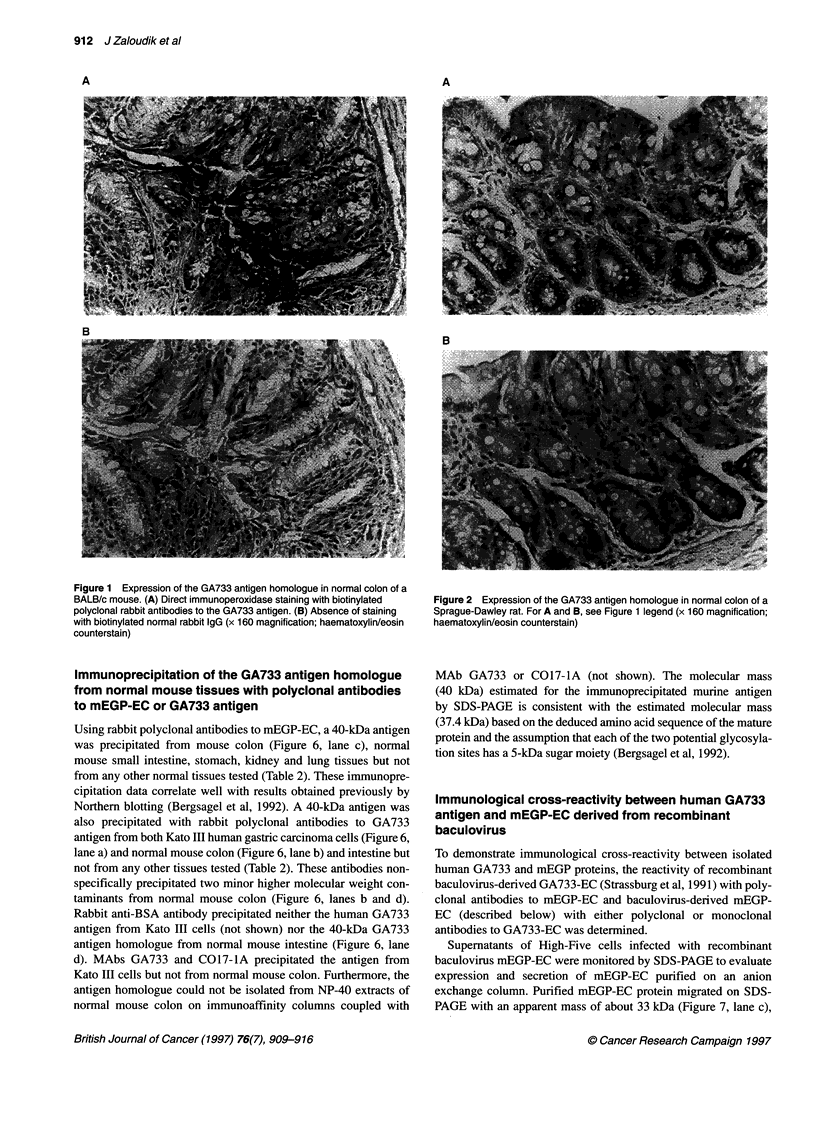
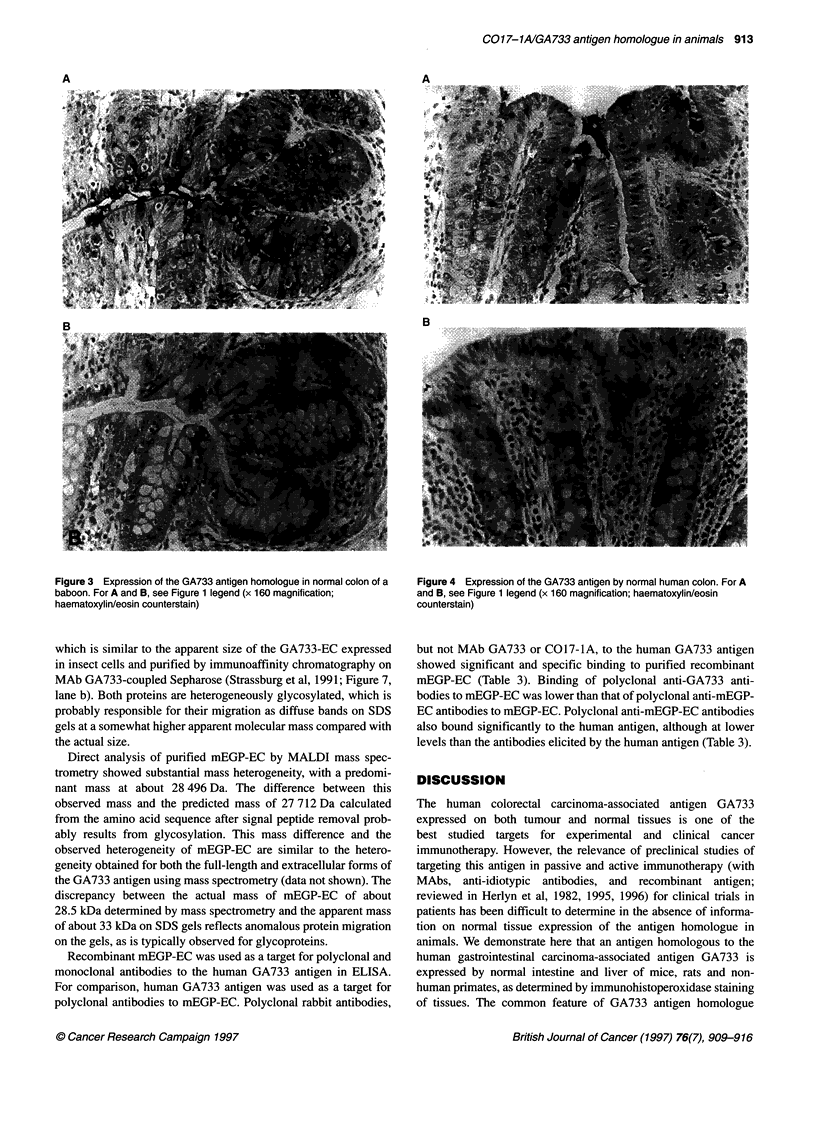
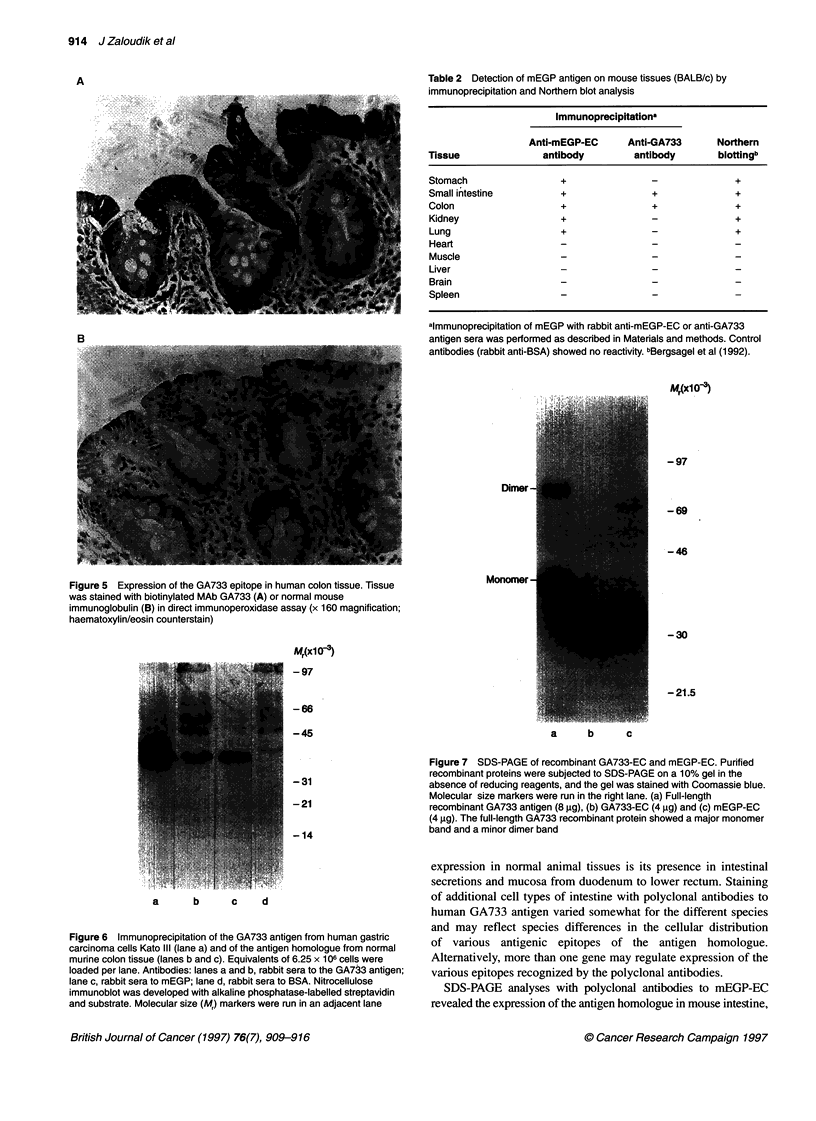
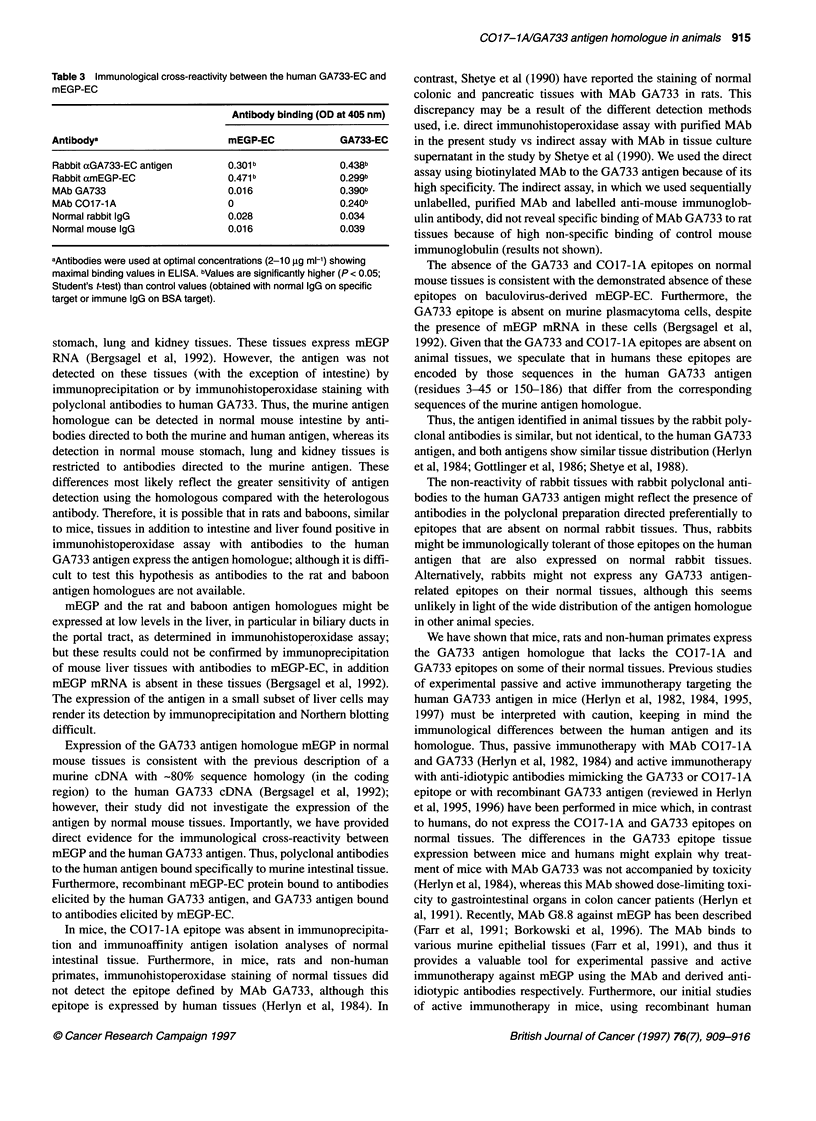
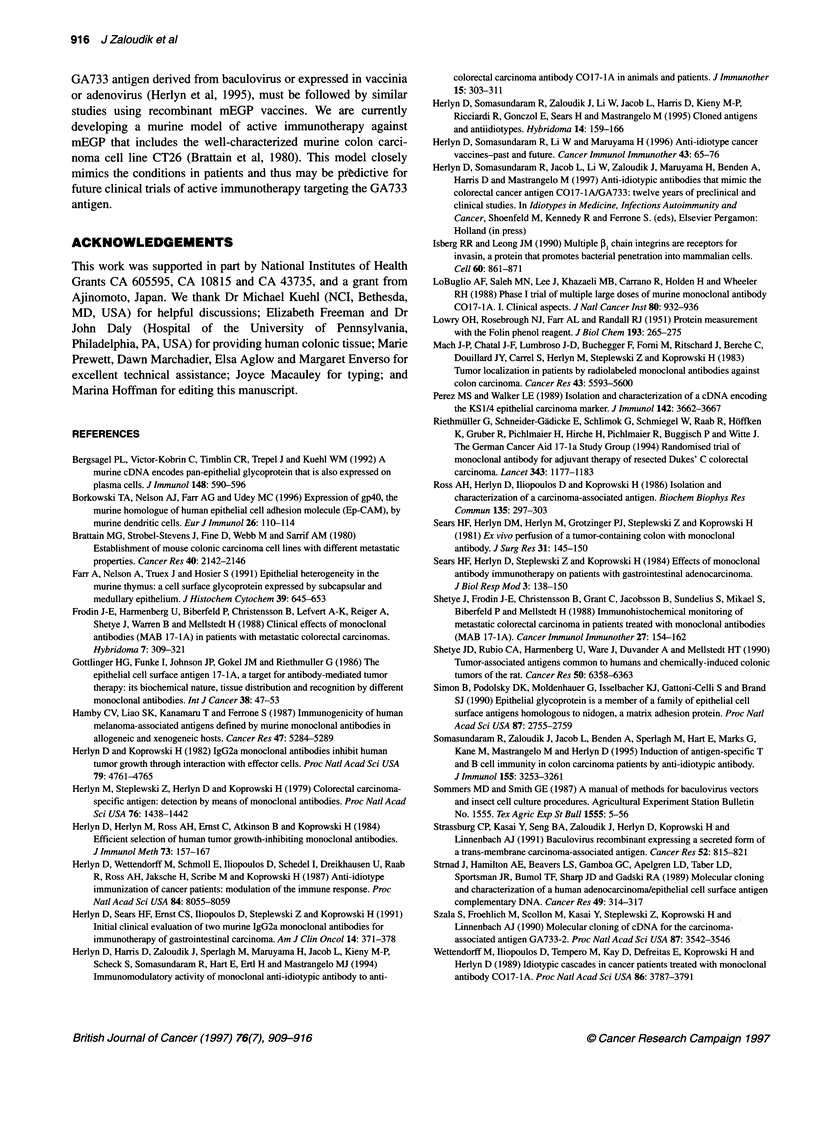
Images in this article
Selected References
These references are in PubMed. This may not be the complete list of references from this article.
- Bergsagel P. L., Victor-Kobrin C., Timblin C. R., Trepel J., Kuehl W. M. A murine cDNA encodes a pan-epithelial glycoprotein that is also expressed on plasma cells. J Immunol. 1992 Jan 15;148(2):590–596. [PubMed] [Google Scholar]
- Borkowski T. A., Nelson A. J., Farr A. G., Udey M. C. Expression of gp40, the murine homologue of human epithelial cell adhesion molecule (Ep-CAM), by murine dendritic cells. Eur J Immunol. 1996 Jan;26(1):110–114. doi: 10.1002/eji.1830260117. [DOI] [PubMed] [Google Scholar]
- Brattain M. G., Strobel-Stevens J., Fine D., Webb M., Sarrif A. M. Establishment of mouse colonic carcinoma cell lines with different metastatic properties. Cancer Res. 1980 Jul;40(7):2142–2146. [PubMed] [Google Scholar]
- Farr A., Nelson A., Truex J., Hosier S. Epithelial heterogeneity in the murine thymus: a cell surface glycoprotein expressed by subcapsular and medullary epithelium. J Histochem Cytochem. 1991 May;39(5):645–653. doi: 10.1177/39.5.2016514. [DOI] [PubMed] [Google Scholar]
- Frödin J. E., Harmenberg U., Biberfeld P., Christensson B., Lefvert A. K., Rieger A., Shetye J., Wahren B., Mellstedt H. Clinical effects of monoclonal antibodies (MAb 17-1A) in patients with metastatic colorectal carcinomas. Hybridoma. 1988 Aug;7(4):309–321. doi: 10.1089/hyb.1988.7.309. [DOI] [PubMed] [Google Scholar]
- Göttlinger H. G., Funke I., Johnson J. P., Gokel J. M., Riethmüller G. The epithelial cell surface antigen 17-1A, a target for antibody-mediated tumor therapy: its biochemical nature, tissue distribution and recognition by different monoclonal antibodies. Int J Cancer. 1986 Jul 15;38(1):47–53. doi: 10.1002/ijc.2910380109. [DOI] [PubMed] [Google Scholar]
- Hamby C. V., Liao S. K., Kanamaru T., Ferrone S. Immunogenicity of human melanoma-associated antigens defined by murine monoclonal antibodies in allogeneic and xenogeneic hosts. Cancer Res. 1987 Oct 15;47(20):5284–5289. [PubMed] [Google Scholar]
- Herlyn D., Harris D., Zaloudik J., Sperlagh M., Maruyama H., Jacob L., Kieny M. P., Scheck S., Somasundaram R., Hart E. Immunomodulatory activity of monoclonal anti-idiotypic antibody to anti-colorectal carcinoma antibody CO17-1A in animals and patients. J Immunother Emphasis Tumor Immunol. 1994 May;15(4):303–311. doi: 10.1097/00002371-199405000-00009. [DOI] [PubMed] [Google Scholar]
- Herlyn D., Herlyn M., Ross A. H., Ernst C., Atkinson B., Koprowski H. Efficient selection of human tumor growth-inhibiting monoclonal antibodies. J Immunol Methods. 1984 Oct 12;73(1):157–167. doi: 10.1016/0022-1759(84)90041-3. [DOI] [PubMed] [Google Scholar]
- Herlyn D., Koprowski H. IgG2a monoclonal antibodies inhibit human tumor growth through interaction with effector cells. Proc Natl Acad Sci U S A. 1982 Aug;79(15):4761–4765. doi: 10.1073/pnas.79.15.4761. [DOI] [PMC free article] [PubMed] [Google Scholar]
- Herlyn D., Sears H. F., Ernst C. S., Iliopoulos D., Steplewski Z., Koprowski H. Initial clinical evaluation of two murine IgG2a monoclonal antibodies for immunotherapy of gastrointestinal carcinoma. Am J Clin Oncol. 1991 Oct;14(5):371–378. doi: 10.1097/00000421-199110000-00002. [DOI] [PubMed] [Google Scholar]
- Herlyn D., Somasundaram R., Li W., Maruyama H. Anti-idiotype cancer vaccines: past and future. Cancer Immunol Immunother. 1996 Oct;43(2):65–76. doi: 10.1007/s002620050305. [DOI] [PubMed] [Google Scholar]
- Herlyn D., Somasundaram R., Zaloudik J., Li W., Jacob L., Harris D., Kieny M. P., Ricciardi R., Gonczol E., Sears H. Cloned antigens and antiidiotypes. Hybridoma. 1995 Apr;14(2):159–166. doi: 10.1089/hyb.1995.14.159. [DOI] [PubMed] [Google Scholar]
- Herlyn D., Wettendorff M., Schmoll E., Iliopoulos D., Schedel I., Dreikhausen U., Raab R., Ross A. H., Jaksche H., Scriba M. Anti-idiotype immunization of cancer patients: modulation of the immune response. Proc Natl Acad Sci U S A. 1987 Nov;84(22):8055–8059. doi: 10.1073/pnas.84.22.8055. [DOI] [PMC free article] [PubMed] [Google Scholar]
- Herlyn M., Steplewski Z., Herlyn D., Koprowski H. Colorectal carcinoma-specific antigen: detection by means of monoclonal antibodies. Proc Natl Acad Sci U S A. 1979 Mar;76(3):1438–1442. doi: 10.1073/pnas.76.3.1438. [DOI] [PMC free article] [PubMed] [Google Scholar]
- Isberg R. R., Leong J. M. Multiple beta 1 chain integrins are receptors for invasin, a protein that promotes bacterial penetration into mammalian cells. Cell. 1990 Mar 9;60(5):861–871. doi: 10.1016/0092-8674(90)90099-z. [DOI] [PubMed] [Google Scholar]
- LOWRY O. H., ROSEBROUGH N. J., FARR A. L., RANDALL R. J. Protein measurement with the Folin phenol reagent. J Biol Chem. 1951 Nov;193(1):265–275. [PubMed] [Google Scholar]
- LoBuglio A. F., Saleh M. N., Lee J., Khazaeli M. B., Carrano R., Holden H., Wheeler R. H. Phase I trial of multiple large doses of murine monoclonal antibody CO17-1A. I. Clinical aspects. J Natl Cancer Inst. 1988 Aug 17;80(12):932–936. doi: 10.1093/jnci/80.12.932. [DOI] [PubMed] [Google Scholar]
- Mach J. P., Chatal J. F., Lumbroso J. D., Buchegger F., Forni M., Ritschard J., Berche C., Douillard J. Y., Carrel S., Herlyn M. Tumor localization in patients by radiolabeled monoclonal antibodies against colon carcinoma. Cancer Res. 1983 Nov;43(11):5593–5600. [PubMed] [Google Scholar]
- Perez M. S., Walker L. E. Isolation and characterization of a cDNA encoding the KS1/4 epithelial carcinoma marker. J Immunol. 1989 May 15;142(10):3662–3667. [PubMed] [Google Scholar]
- Riethmüller G., Schneider-Gädicke E., Schlimok G., Schmiegel W., Raab R., Höffken K., Gruber R., Pichlmaier H., Hirche H., Pichlmayr R. Randomised trial of monoclonal antibody for adjuvant therapy of resected Dukes' C colorectal carcinoma. German Cancer Aid 17-1A Study Group. Lancet. 1994 May 14;343(8907):1177–1183. doi: 10.1016/s0140-6736(94)92398-1. [DOI] [PubMed] [Google Scholar]
- Ross A. H., Herlyn D., Iliopoulos D., Koprowski H. Isolation and characterization of a carcinoma-associated antigen. Biochem Biophys Res Commun. 1986 Feb 26;135(1):297–303. doi: 10.1016/0006-291x(86)90976-9. [DOI] [PubMed] [Google Scholar]
- Sears H. F., Herlyn D., Herlyn M., Grotzinger P. J., Steplewski Z., Gerhard W., Koprowski H. Ex vivo perfusion of a tumor-containing colon with monoclonal antibody. J Surg Res. 1981 Aug;31(2):145–150. doi: 10.1016/0022-4804(81)90042-1. [DOI] [PubMed] [Google Scholar]
- Sears H. F., Herlyn D., Steplewski Z., Koprowski H. Effects of monoclonal antibody immunotherapy on patients with gastrointestinal adenocarcinoma. J Biol Response Mod. 1984;3(2):138–150. [PubMed] [Google Scholar]
- Shetye J. D., Rubio C. A., Harmenberg U., Ware J., Duvander A., Mellstedt H. T. Tumor-associated antigens common to humans and chemically induced colonic tumors of the rat. Cancer Res. 1990 Oct 1;50(19):6358–6363. [PubMed] [Google Scholar]
- Shetye J., Frödin J. E., Christensson B., Grant C., Jacobsson B., Sundelius S., Sylvén M., Biberfeld P., Mellstedt H. Immunohistochemical monitoring of metastatic colorectal carcinoma in patients treated with monoclonal antibodies (MAb 17-1A). Cancer Immunol Immunother. 1988;27(2):154–162. doi: 10.1007/BF00200021. [DOI] [PMC free article] [PubMed] [Google Scholar]
- Simon B., Podolsky D. K., Moldenhauer G., Isselbacher K. J., Gattoni-Celli S., Brand S. J. Epithelial glycoprotein is a member of a family of epithelial cell surface antigens homologous to nidogen, a matrix adhesion protein. Proc Natl Acad Sci U S A. 1990 Apr;87(7):2755–2759. doi: 10.1073/pnas.87.7.2755. [DOI] [PMC free article] [PubMed] [Google Scholar]
- Somasundaram R., Zaloudik J., Jacob L., Benden A., Sperlagh M., Hart E., Marks G., Kane M., Mastrangelo M., Herlyn D. Induction of antigen-specific T and B cell immunity in colon carcinoma patients by anti-idiotypic antibody. J Immunol. 1995 Sep 15;155(6):3253–3261. [PubMed] [Google Scholar]
- Strassburg C. P., Kasai Y., Seng B. A., Miniou P., Zaloudik J., Herlyn D., Koprowski H., Linnenbach A. J. Baculovirus recombinant expressing a secreted form of a transmembrane carcinoma-associated antigen. Cancer Res. 1992 Feb 15;52(4):815–821. [PubMed] [Google Scholar]
- Strnad J., Hamilton A. E., Beavers L. S., Gamboa G. C., Apelgren L. D., Taber L. D., Sportsman J. R., Bumol T. F., Sharp J. D., Gadski R. A. Molecular cloning and characterization of a human adenocarcinoma/epithelial cell surface antigen complementary DNA. Cancer Res. 1989 Jan 15;49(2):314–317. [PubMed] [Google Scholar]
- Szala S., Froehlich M., Scollon M., Kasai Y., Steplewski Z., Koprowski H., Linnenbach A. J. Molecular cloning of cDNA for the carcinoma-associated antigen GA733-2. Proc Natl Acad Sci U S A. 1990 May;87(9):3542–3546. doi: 10.1073/pnas.87.9.3542. [DOI] [PMC free article] [PubMed] [Google Scholar]
- Wettendorff M., Iliopoulos D., Tempero M., Kay D., DeFreitas E., Koprowski H., Herlyn D. Idiotypic cascades in cancer patients treated with monoclonal antibody CO17-1A. Proc Natl Acad Sci U S A. 1989 May;86(10):3787–3791. doi: 10.1073/pnas.86.10.3787. [DOI] [PMC free article] [PubMed] [Google Scholar]



